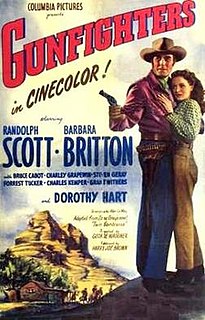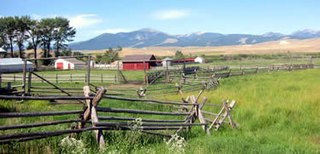
The Johnson County War, also known as the War on Powder River and the Wyoming Range War, was a range conflict that took place in Johnson County, Wyoming from 1889 to 1893. The conflict began when cattle companies started ruthlessly persecuting alleged rustlers in the area, many of whom were innocent settlers that competed with them for land, livestock and water rights. As tensions swelled between the large established ranchers and the smaller settlers in the state, violence finally culminated in Powder River Country, when the ranchers hired armed gunmen to invade the county. The gunmen's initial incursion in the territory aroused the small farmers and ranchers, as well as the state lawmen, and they formed a posse of 200 men that led to a grueling stand-off. The siege ended when the United States Cavalry on the orders of President Benjamin Harrison relieved the two forces, although further fighting persisted in the following months.
A ranch is a place where ranching, a process of raising livestock, especially cattle, is performed.
Ranchero is the term in the Spanish language for a rancher, meaning a person working on a ranch.
Richard King was a riverboat captain, confederate, entrepreneur, and most notably, the founder of the King Ranch in South Texas, which at the time of his death in 1885 encompassed over 825,000 acres (3,340 km2).

Redington is a populated place in Pima County, Arizona, United States.

Go West (1925) is a silent movie starring Buster Keaton.
Heart of the Golden West is a 1942 American film western starring Roy Rogers.

The Mysterious Rider is a 1938 American Western film directed by Lesley Selander and starring Douglass Dumbrille, Sidney Toler, and Russell Hayden. Written by Maurice Geraghty based on the 1921 novel The Mysterious Rider by Zane Gray, the film is about a notorious outlaw who returns to the ranch he once owned and takes a job disguised as a ranch hand. Unrecognized by the ranch's current owner, he waits patiently for an opportunity to expose the men who murdered his partner twenty years ago, framed him for the crime, and then stole his ranch. The film was later released for television in the United States as Mark of the Avenger.
Robert N. Krentz Jr. was a prominent rancher in the U.S. state of Arizona. Active in a family cattle ranching business stretching back nearly 100 years, he and his family ranch were inducted into the Arizona Farming and Ranching Hall of Fame in 2008. Krentz was featured several times during the 1990s and 2000s (decade) in media reports regarding the problems surrounding illegal immigration across the Arizona stretch of the United States – Mexico border, particularly regarding its impact on ranching.

A cowman is a person who works specifically with cattle.
Cattle baron is a historic term for a local businessman and landowner who possessed great power or influence through the operation of a large ranch with many beef cattle. Cattle barons in the late 19th century United States were also sometimes referred to as cowmen, stockmen, or just ranchers. In Australia, similar individuals owned large cattle stations. A similar phenomenon occurred in part of Canada in the early twentieth century.

Billy the Kid's Gun Justice is a 1940 American western directed by Sam Newfield for Producers Releasing Corporation, and 3rd in PRC's Billy the Kid series.

Cattle Stampede is a 1943 American Producers Releasing Corporation Western film of the "Billy the Kid" series directed by Sam Newfield.

Springtime in the Rockies is a 1937 American Western film directed by Joseph Kane and starring Gene Autry, Smiley Burnette, and Polly Rowles. Written by Gilbert Wright and Betty Burbridge, the film is about a ranch owner who brings a flock of sheep into cattle country and faces the opposition of local ranchers with the help of her ranch foreman.

Gunfighters is a 1947 American Western Cinecolor film directed by George Waggner and starring Randolph Scott, Barbara Britton, and Bruce Cabot. Based on the novel Twin Sombreros by Zane Grey and with a screenplay by The Searchers author Alan Le May, the film is about a gunfighter who lays down his guns after being forced to shoot his best friend, and decides to become a cowhand on a ranch. The film was released in the United Kingdom as The Assassin.

The Singing Hill is a 1941 American Western film directed by Lew Landers and starring Gene Autry, Smiley Burnette, and Virginia Dale. Based on a story by Jesse Lasky Jr. and Richard Murphy, the film is about a singing cowboy and foreman of a ranch that may be sold to an unstrupulous banker by the young madcap heiress who is unaware that the sale will result in the local ranchers losing their free grazing land and their ranches. In the film, Autry introduced the song "Blueberry Hill" which would become a standard recorded by such artists as Louis Armstrong (1949), Fats Domino (1956), and Elvis Presley (1957). The song became one of Autry's best-selling recordings. In 1987, "Blueberry Hill" received an ASCAP Award for Most Performed Feature Film Standards on TV.

Orphan of the Pecos is a 1937 American Western film produced and directed by Sam Katzman and starring Tom Tyler, Jeanne Martel, Howard Bryant, and Forrest Taylor. Written by Basil Dickey, the film is about a cowboy who is falsely accused of murdering a rancher whose body he discovers. Before the sheriff arrives, he escapes and tries to find evidence to clear his name and help the rancher's daughter save her ranch. The film was released in the United States on December 30, 1937 by Victor Pictures.
A ranch school is a type of school used in rural areas of the Western United States.












